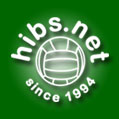ANY HIBS FAN asked to name the first British club to take part in the European Cup will proudly state that the honour fell to Hibernian Football Club. Of course Hibs had been pioneers of the sport of football, playing many games overseas before that tournament came into being.
Indeed almost a year to the day upon which World War Two ended, Hibs were in Germany facing a British Army on the Rhine side and winning 3-0. The gesture of travelling to a country still ravaged by the horrors of war was not lost on people both outwith and within the sport and that fact would prove vital when organised competition came into being.
In the summer of 1947 the Easter Road club toured Belgium and Norway and the former country again a year later. The Board at Easter Road was ever keen to proudly show off the talents of the players on foreign soil and the likes of Austria, France, Germany and Czechoslovakia were soon stamping Hibs players passports at Border Control. In June 1953 Hibs branched out even further, travelling to Brazil and playing three friendlies there but it has to be said that the Scottish sporting press gave those tours very little by way of coverage unlike their English counterparts who pronounced loudly that in their view Wolverhampton Wanderers were Champions of Europe after that club had enjoyed a successful run of good results on that continent.
What those English hacks were not to know was that their outrageous boasting had rattled a gentleman by the name of Gabriel Hanot who was sports editor and journalist of the prestigious French football magazine L’Equippe. Determined to upstage the English Hanot took it upon himself to organise a European Cup where the best sides from a number of European countries would play each other home and away for a handsome trophy. The inaugural tournament was by invitation only and although Hibs were not the Scottish Champions they were selected to take part because the French sporting press at least recognised the fact that the Easter Road club had played many times in Europe in friendly matches. Another key factor was that Hibs were the only Scottish side with floodlights, essential for the playing of midweek matches.
The FA’s of Portugal, Serbia, Hungary, Belgium, Switzerland, Spain, Germany, Scotland, Sweden, Poland, Denmark, France, Austria, Holland and Italy all agreed to allow their clubs to compete but arrogantly the English FA refused to recognise the tournament and preferred instead to believe what they were reading about Wolves.
The first round of the tournament paired Hibs with German outfit Rot Weiss Essen who were declared to be the German Champions although it’s only fair to say that the leagues in that country were not yet back up to full speed and were still being played on a regional basis. For that reason Germany was the only country with two teams in the tournament. Clearly Essen had won their league and so it was that on 14 September 1955 Hibernian Football Club became the first British side to play in the European Cup. The first leg was in Essen where large numbers of British troops made their way to the ground to cheer on the Scots. With heavy rain falling steadily and the pitch turning into a bit of a mudbath it didn’t take Hibs long to establish their superiority but a full 35 minutes had elapsed before Eddie Turnbull beat German international goalkeeper Fritz Herkenrath with Hibs and Great Britain’s first ever goal scored in the tournament. With the break approaching Turnbull grabbed another goal and then early in the second half he laid on a third, scored by Lawrie Reilly. Around eight minutes from time Willie Ormond added a fourth before both teams were cheered as they left the pitch.
A month later the Germans visited Easter Road for the second leg where around 30,000 fans watched a home side peppered with reserve players fight out a 1-1 draw. Both Tommy Younger and Gordon Smith were absent due to travel problems and that gave Willie Adams his chance in goal and young Jock Buchanan a slot on the right wing. Whilst the visitors gave a decent account of themselves Hibs found Essen keeper Herkenrath, known as the Black Panther in his own country, in fine form but he was helpless when a wonderful move involving Turnbull, Jimmy Mulkerrin and Ormond set up Jock Buchanan to bullet the ball home from four yards. Such was the beauty of the move that even the German players applauded! Early in the second half, Essen right winger Abromell, his long curly hair held in place by a hair net, was fastest to react to a loose ball in firing home an equaliser but that was it as far as the visitors were concerned and they went out of the tournament on a 5-1 aggregate score.
Five weeks later it was Djurgaardens the Champions of Sweden that Hibs faced in round two which was also the quarter final. In light of the weather conditions in their home land the Swedes had elected to play their ‘home’ tie in Glasgow at the ground of Partick Thistle where more than 20,000 fans squeezed in to watch a fascinating encounter. A sizeable number had travelled east from Edinburgh but the Glasgow public were intrigued by this new fangled tournament and so the crowd was swelled with many neutral supporters as well as those of the men in green and white.
Almost from the off the Swedes began to impress with their neat passing play and quick movement. Indeed many in the crowd were just settling in to watch when the ‘home’ side took a shock lead after Holstrom’s intelligent through ball allowed Eklund to lash the ball past Tommy Younger. Stung into action Hibs camped out in the Djurgaardens half and twice in quick succession Arne Arvidsson pulled off magnificent saves to deny first Gordon Smith and then Bobby Combe. In time Arvidsson would earn his wages big style as he thwarted the Hibs attackers with a string of brilliant saves prompting Daily Record sports editor James Cameron to later write “Arvidsson was the man standing between Hibs and a disaster for his side” and adding “this was European Cup football that made Scottish League football look like Boys Brigade stuff.”
With the crowd roaring them on Hibs got level after 18 minutes as Smith dazzled his opponents on the right before delivering a cross into the area where Combe arrived to bang a hard shot beyond Arvidsson. With Smith at his very best on the right and both Combe and Mulkerrin ever willing runners it was only a matter of time before a lead was established and that came early in the second half when Jimmy Mulkerrin went through one on one with Arvidsson, skipped around the keeper with ease and rolled the ball home to make it 2-1. Minutes later Forsberg decided the only way to stop Smith from running riot was to chop him down which he did, earning a stern word from English referee Arthur Ellis. As for Smith he simply carried on as before, finding Mulkerrin in the box with the Hibs man hauled down by Olsson but Turnbull shot wide from the resultant penalty. With just a couple of minutes left another Smith cross was competed for by Olsson and Ormond with the ball finding the net amid some confusion as to who got the final touch. Of course Ormond claimed it though some reported it as an own goal but no matter the scorer it still meant a 3-1 win for Hibs. After the game the Swedish manager kept his players in the dressing room for some time and once he emerged it was to advise that an urgent message had been sent home to arrange for Hans Tvilling to be sent to Scotland for the return leg. Tvilling was their playmaker and the Swedes obviously felt his presence would help them overturn the first leg deficit.
It had been agreed that Djurgaardens would remain in Scotland and play the second leg the following Monday evening at Easter Road. On the Saturday prior to that the whole of the visiting party sat in the centre stand at the home of Hibs and watched the green and whites totally destroy Partick Thistle in comprehensively beating the Jags 5-1. Quite what watching that game did for their confidence is not clear but 48 hours later they faced that green and white machine in front of 31,000 supporters and found themselves outplayed virtually from start to finish. Tvilling was in the Djurgaardens eleven but frankly he’d have been as well staying in Stockholm and going to the pictures for all the impact he made. Their star man was Arne Arvidsson who turned in a five star display to restrict Hibs to a single goal victory thanks to a Turnbull penalty twenty minutes from the end.
By this stage Hibs had beaten Essen 5-1 and Djurgaardens 4-1 to reach the semi final and at long last the Scottish sporting press was beginning to take an interest, one newspaper proclaiming that the kind of form Hibs were showing could well lead to the cup being brought home to Edinburgh. As it was the semi final was not scheduled until the following April and so Hibs concentrated solely on the League and Scottish Cup until the months ticked down.
When the big day arrived it sent Hibs to France to face Stad Rhiems whilst the other semi final was between Real Madrid and AC Milan! Coming near the end of a long gruelling season for Hibs the thought of reaching the final put a spring in the step of the Easter Road men as they walked out of the tunnel in the Parc de Princes in front of 36,000 fans. Both sides had chances in the first half with the legendary Raymond Kopa twice bringing out the best in Tommy Younger. The home side was very strong defensively with their centre half Jonquet a French international of some class and he and his colleagues were very effective in keeping the likes of Smith and Reilly quiet. Only twenty minutes remained when Rhiems finally found a way through, a header from Leblond looping over Younger and into the net. At the other end Ormond struck a post but with virtually the last kick of the game Bilard added a second for the hosts.
Two weeks later a record midweek crowd of 46,000 packed into Easter Road for the second leg tie and watched Hibs bombard the French goal for almost the entire ninety minutes. Bad luck, poor finishing and excellent goalkeeping meant Hibs failed to find a way through whilst Rhiems struck the only goal of the game through Glovakie who looked a mile offside but was allowed to race through and beat Younger.
The dream of European glory was over but Hibs had given an excellent account of themselves and had made many friends along the way with their stylish passing play and when needed their robust defending. Sadly for their conquerors it would be Real Madrid that beat them in the final, the first of an amazing five consecutive final wins for the Spanish giants.
Watch out for more articles in this series .... coming soon!
**Image courtesy of hibsprogrammes.co.uk**



 Menu
Menu Categories
Categories

Phil D. Rolls- 19-05-2010, 04:37 PMronaldo7- 19-05-2010, 09:37 PMvBulletin Message